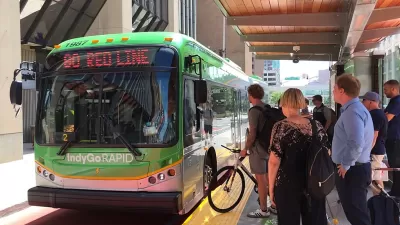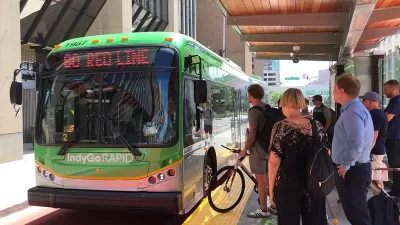The IndyGo transit system is wrapping up a period of free fares for its new Red Line bus rapid transit line before another big launch scheduled for spring 2020.

Kellie Hwang reports on the ridership figures from the first month of operation on the IndyGo Red Line bus rapid transit line in Indianapolis.
Ridership on the IndyGo Red Line surpassed 230,000 in the first month of Indianapolis' new rapid transit bus service.
IndyGo last week reported 230,651 boardings in September, or an average of nearly 7,700 per day. Total bus ridership systemwide was up 30%.
The Red Line has been free to ride since it launched Sept. 1. Nov. 11 is the planned date for tickets to be required, which is expected to affect ridership.
Despite that expected initial effect when fares are no longer free, IndyGo planners have more good transit news on the way in the spring, when the Marion County Transit Plan will roll out improved bus frequencies, longer hours of operation, and easier transfers.
All these improvements are made possible by a dedicated income tax supported by voters in 2016, before a delay and then approval by the City-County Council. Initial investments in the IndyGo bus system, made possible by the new tax revenue, also proved beneficial to bus ridership in 2018.
FULL STORY: Red Line ridership numbers for September are in. Here's how many are riding.

Maui's Vacation Rental Debate Turns Ugly
Verbal attacks, misinformation campaigns and fistfights plague a high-stakes debate to convert thousands of vacation rentals into long-term housing.

Planetizen Federal Action Tracker
A weekly monitor of how Trump’s orders and actions are impacting planners and planning in America.

In Urban Planning, AI Prompting Could be the New Design Thinking
Creativity has long been key to great urban design. What if we see AI as our new creative partner?

King County Supportive Housing Program Offers Hope for Unhoused Residents
The county is taking a ‘Housing First’ approach that prioritizes getting people into housing, then offering wraparound supportive services.

Researchers Use AI to Get Clearer Picture of US Housing
Analysts are using artificial intelligence to supercharge their research by allowing them to comb through data faster. Though these AI tools can be error prone, they save time and housing researchers are optimistic about the future.

Making Shared Micromobility More Inclusive
Cities and shared mobility system operators can do more to include people with disabilities in planning and operations, per a new report.
Urban Design for Planners 1: Software Tools
This six-course series explores essential urban design concepts using open source software and equips planners with the tools they need to participate fully in the urban design process.
Planning for Universal Design
Learn the tools for implementing Universal Design in planning regulations.
planning NEXT
Appalachian Highlands Housing Partners
Mpact (founded as Rail~Volution)
City of Camden Redevelopment Agency
City of Astoria
City of Portland
City of Laramie




























